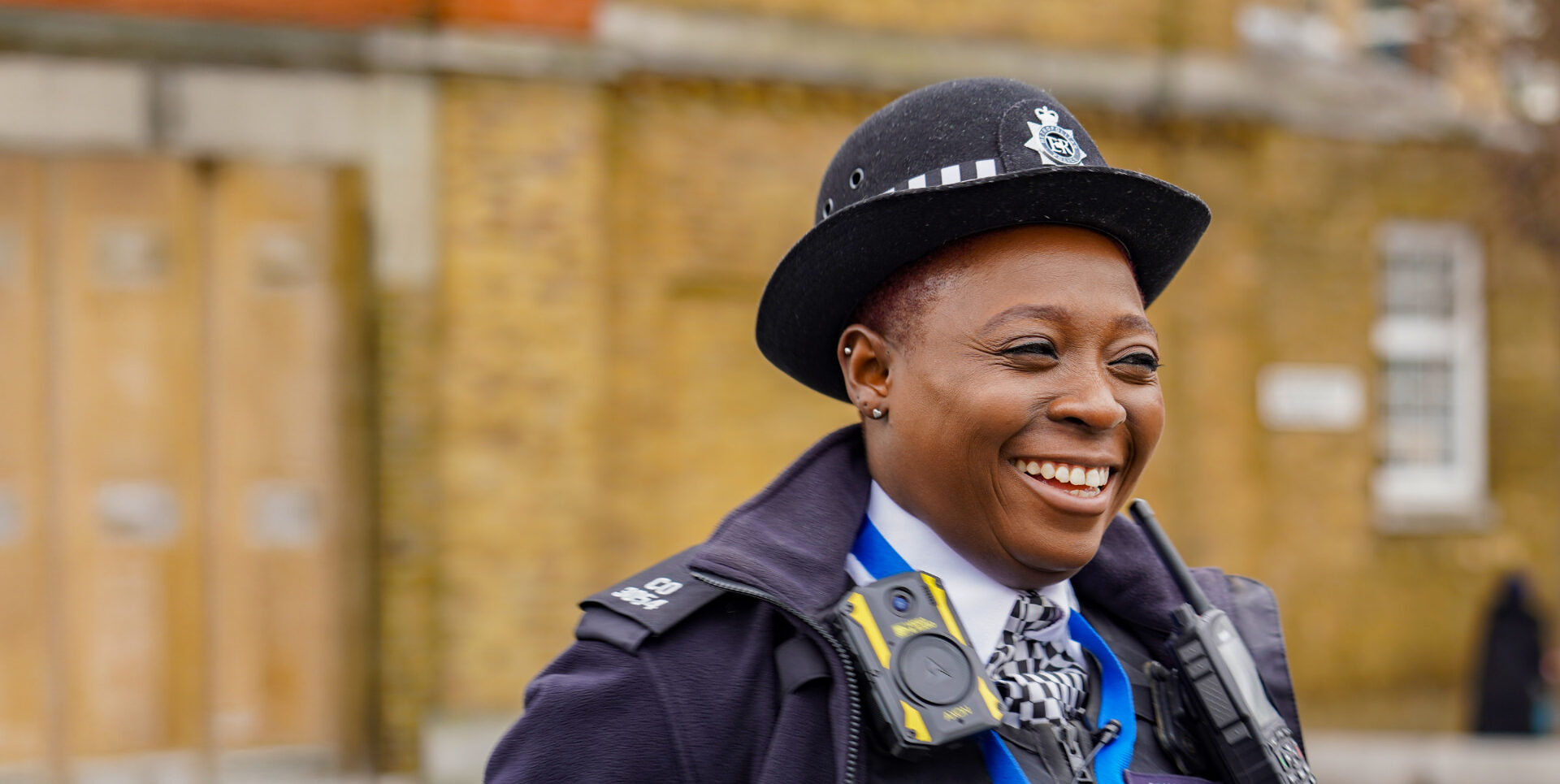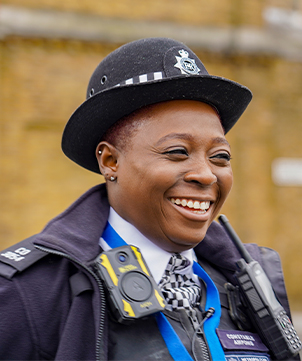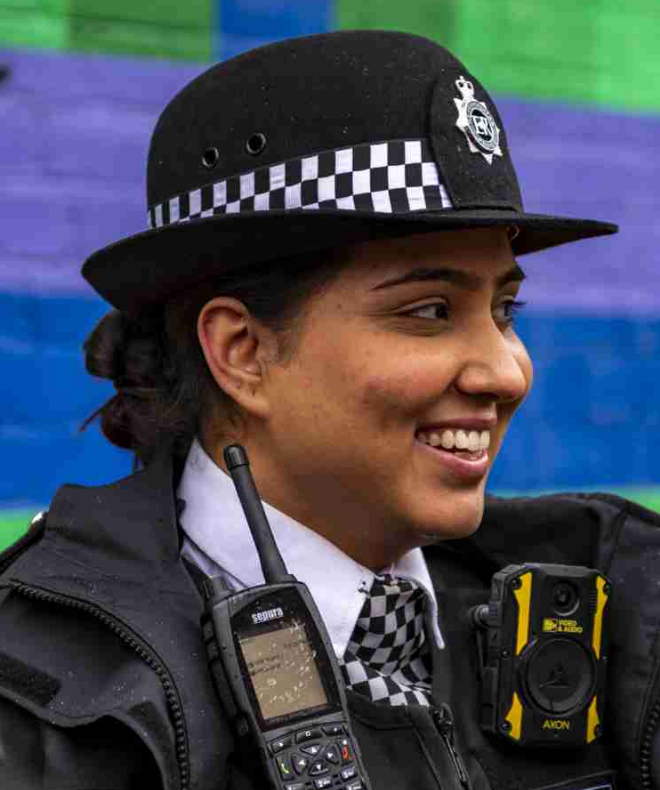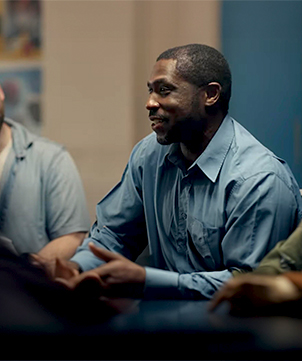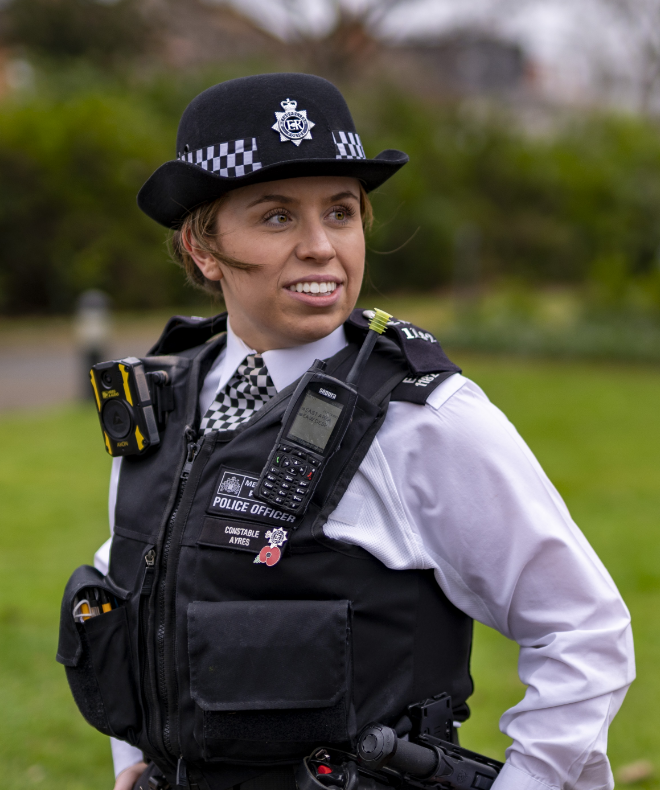Transferring or returning to the Met
We’re working hard to restore Londoners’ trust. We have a big job in front of us, and it will take time – but you can be a part of the change. Our goal is to drive more trust, reduce crime, and maintain high standards. One way we’ll do this is by offering the best, most dedicated and hard-working officers the chance to reach their full potential. As a serving or returning police officer, you don’t need to live in or move to London to join us. We accept applications from officers in all Home Office-funded forces.
The opportunity
Show us what you can do in one of the world’s most diverse policing environments. There are opportunities here if you have specialised in any of a variety of policing roles, both uniform and detective. You may be a serving officer elsewhere in the UK – or you may have left your role as an officer (within the last five years) and want to return to policing with a career in the Met.
We want people who share our values of respect, integrity, empathy, courage, and accountability. And who can meet our high standards for behaviour.
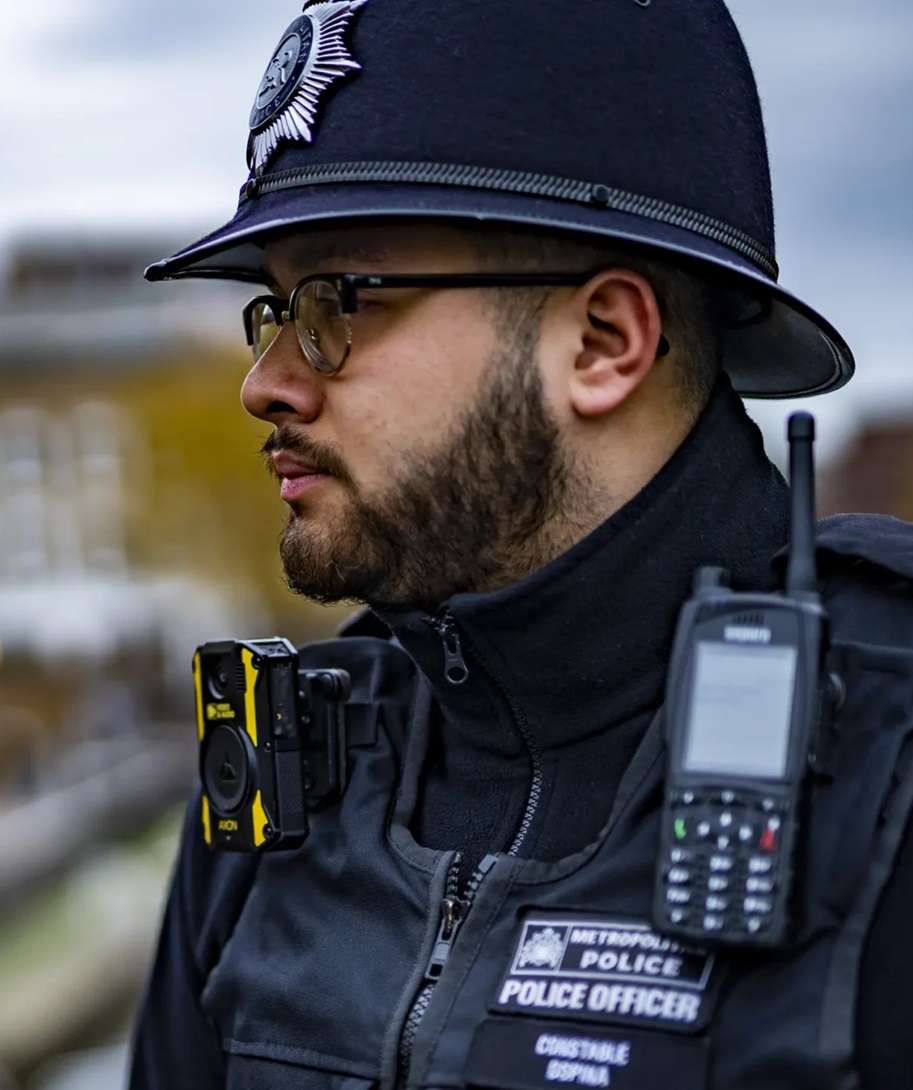
The strongest neighbourhood teams
At the heart of our plans to turn the Met around is the ambition to deliver the strongest-ever neighbourhood teams. We are looking for experienced neighbourhood and engagement officers – people who really understand their beats. You’ll know what it means to be a visible and reassuring presence within your community. Now you can bring your talent for building relationships and solving problems with local people to London’s streets.
Unique specialist teams
The Met is big, diverse and high profile. That means there’s a huge range of potential career paths to explore here. If you are currently working as a specialist (or you’re in a specialist command) please make sure you tell us in your application.
These are the current specialist teams we often recruit into:
-
Based within one of three centres in, Lambeth, Hendon and Bow, MetCC are the first point of call for many Londoners making contact with police.
When actively recruiting, MetCC recruit into both First Contact and Despatch, so your experience and skills may be easily transferred into taking 999 and 101 calls from the public, including our digital and social media platforms.
Perhaps you feel your skills would best suited in our busy despatch environment, supporting front line officers and staff in our 12 BCUs and specialist units by deploying calls and offering intelligence and support functions. You may also specialise in becoming a Pan-London operator assisting our Traffic, Firearms or Mounted Units on the ground or running major and critical events.
We will provide you with all the training and on-going development you will need through our dedicated training academy. Once trained we will ensure you are continually supported through our range of schemes designed to assist all our new joiners, including our buddy and mentor programmes and twice yearly development days.
-
The Metropolitan Police Territorial Support Group sits within the Met’s M07 Taskforce OCU. Providing a 24 hours a day, seven days per week resource, TSG officers are deployed to a wide array of incidents. Whilst public order might be considered their speciality, versatility and problem solving is what makes them such a valuable resource within the MPS.
Here are some of the types of work that a TSG officer will be involved with:
- Level 1 Public Order
- Community engagement
- Advanced MOE
- Counter Terrorism operations
- CBRN (Chemical, Biological, Radiological and Nuclear) incidents
- Rapid entries
- Crime tasking’s on priority boroughs
- 24 Hours commissioners reserve patrols
- Taser building entry searches
- Prison/Stadium training
Candidates do not need to be currently Level 2 trained to apply. They will, however, be expected to pass a Level 2 course and CBRN medical once assessed and accepted into MO7 TSG. If unsuccessful in either of these requirements, candidates will be posted to a basic command unit (BCU) and not retained in MO7. Our specialist skills requires officers to have, and maintain a good level of fitness. Physical training is incorporated into core TSG shifts. It is highly likely that you will be required to undertake taser training during your Met TSG service. Transferee officers are required to obtain a mentor and undertake an attachment/base visit prior to assessment for this role. This can be facilitated by MO7 Recruitment team.
The base locations are: NW – Alperton, NE – Chadwell Heath, SE – Catford, SW – Clapham.
-
National Headquarters (CTPHQ)
Uniquely the police service, and specifically the counter terrorism (CT) network contributes to all four pillars of the governments national counter terrorism (CONTEST) strategy.
The counter terrorism policing headquarters, on behalf of government and the National Police Chiefs’ Council (NPCC), ensures that the CT network has the funding, capabilities and resources it needs to deliver CONTEST effectively and to keep people safe from terrorism.
It does this through the provision of corporate services, as well as national operational tasking and coordination. It houses a number of unique national CT capabilities that support the entire network, as well as overseeing delivery of CT policing across the regions to ensure that it operates in a way that is both effective and efficient.
Crucially CTPHQ represents CT policing’s interest within government and with wider stakeholders, ensuring that the policing contribution to CONTEST is both understood and appreciated. Hosted by the Metropolitan Police, counter terrorism policing oversees the UK’s national Counter Terrorism Policing network.
Counter terrorism command (SO15)
The Metropolitan Police Service has a counter terrorism command (SO15). This is responsible for pro-active intelligence-led operations to prevent and disrupt acts of terrorism and re-active investigations of acts or attempted acts of terrorism in London and the East of England.
SO15 works in partnership with intelligence and security partners to gather, assess, analyse and develop intelligence to drive operational activity to protect London and the UK from the threat of terrorism, extremism and subversion. SO15 replaced the Met’s special branch and anti-terrorist branch and also has an international role and is the point of contact for international partners in counter terrorism matters.
There are three main business areas within SO15 as detailed below:
- Operations – Owns and drives the operational activity of SO15 with strategic and tactical management of investigations and operations.
- Operations Support – Specialist capabilities which support SO15 operations to deliver both the covert and overt phases of an investigation.
- Business Management Services – Co-ordination and organisation of business-supporting activities.
-
Have you ever thought about a career in the Technical Surveillance Unit?
The Met’s Covert Policing Command support operational teams in a wide range of planned and dynamic technical challenges, tackling serious and organised crime, threats to life and counter terrorism.
Based in London but prepared to deploy on occasions across the UK, Covert Policing is offering you the unique and exciting opportunity to join our first class team of specialist surveillance officers.
Our officers work in close collaboration with our Covert Policing engineering colleagues to facilitate the provision of technical surveillance, gathering evidence to support successful prosecutions in pursuit of Met priority operations and protecting the public.
We look for dynamic officers who are currently trained and qualified in national mobile/foot surveillance working within specialist teams in the Technical Surveillance Unit. Officers must have proven experience in developing technical tactical options, the deployment, management and disclosure of data/information that accompanies such actions. Applicants must possess a good knowledge of RIPA/TEI legislation and the knowledge of digital/cyber technology is desirable.
Essential criteria
- Security checked (SC) Vetting
- Nationally qualified mobile/foot surveillance
- A working knowledge of covert operations and tactics
- Experience in handling, disseminating and storing sensitive information/data, intelligence or product
- Team player with excellent verbal and written communication skills
- Efficient use of corporate IT systems
-
Sexual Offences Investigative Techniques (SOIT) Officer
SOIT officers are based within the Rape and Serious Sexual Assault (RaSSO) teams on each of our 12 Borough Command Unit’s and are part of the specialist investigation unit entrusted by the public to care for our victim survivors and undertake effective investigations of RaSSO cases.
Where supported by the evidence we’ll successfully prosecute these most serious and complex of cases in order to seek justice and protect the public.
A SOIT officer supports victim survivors from the initial report, through to the conclusion of the investigation. Once assigned to a case, as the SOIT officer you’ll be the victim’s single point of contact for the investigation. You’ll be responsible for providing them with the highest quality of victim care. You’ll be trained to secure best evidence from the victim. You’ll work closely with partner agencies to ensure the right support is provided to them.
As a SOIT officer you’ll work collaboratively with investigator colleagues to conduct victim interviews, implement safeguarding measures, share knowledge and best practice, becoming experts in your field.
Working within a RaSSO team, you’ll be deployed alongside other SOIT officers and investigating officers to support victims of serious sexual assault, and to obtain high quality evidence from them. As part of your role you’ll be trained to respond to both recent and non-recent reports of rape, and to provide victims with expert support and care from the time of reporting through to the conclusion of the investigation.
Although you’ll be part of a wider team you’ll work autonomously. You’ll establish positive connections with victims who will have experienced violence, abuse and/or trauma by building rapport through empathy. Because of your excellent interpersonal skills and training, you’ll be best placed to act as the single point of contact between the victim and the investigation, ensuring that the voice of the victim is represented at every stage of the investigative process. This will involve relaying important information clearly, sensitively and tactfully, enabling you to gain the trust and confidence of victims to ensure they feel informed and supported over the course of the investigation.
The role balances investigation and advocacy: You’ll play a fundamental part in investigations into the most serious sexual assaults; with specific responsibility for securing the best evidence from victims. You’ll assess and explore all methods of evidence gathering ensuring the most appropriate options are chosen. You’ll work at all times to reconcile and balance the needs of a victim against the requirements of an investigation. You’ll demonstrate problem solving skills to overcome issues which could cause delay. You’ll remain impartial and assist investigators with objective case assessments.
Key responsibilities
As a SOIT officer your main responsibilities will be:
- to ensure that victims receive the highest standard of care and support throughout an investigation regardless of their intention or ability to support prosecution and to increase the confidence and trust of victims by being the single point of contact for them
- to explain the criminal justice process to the victim and keep them informed about the progress of the investigation and to ensure information is given to the victim positively and carefully to prevent any loss of confidence in the police investigation or the criminal justice process
- to appropriately and thoroughly explain case decisions particularly when a decision is made to discontinue the case
- to work in partnership with staff from the Sexual Assault Referral Centre (SARC) which is Haven in London, the Independent Sexual Violence Advocates (ISVAs) and victim care agencies to ensure a first class multi-agency approach to supporting victim’s needs throughout an investigation
- to ensure that the best possible evidence is obtained from victims, including written and video recorded evidence, the seizure of exhibits and samples, and the use of early evidence kits where appropriate; to suggest other reasonable lines of enquiry and to assist investigators in an objective assessment of the evidence you have obtained
- to support the victim with a practical, honest and problem solving approach to overcome any issues which may delay the progress of the investigation
- you’re an integral part of the investigation team, supporting investigations and representing the views of the victim
- to ensure that the victim receives information about support agencies, and that any referrals are made to other agencies in accordance with the victim’s wishes
- to co-ordinate pre-trial support and assess emerging support needs relating to pending court hearings, in conjunction with Witness Care Units and ISVAs
- to ensure accurate records are kept of all interactions with victims and to ensure compliance with the victim code of practice (VCOP) and disclosure obligations under CPIA
Skills and experience
This is not an easy role and although the work will be amongst the most rewarding in policing, it will also be emotionally demanding. Because of this it won’t be for everyone which is why we specifically look for resilient individuals who are able to persevere in the face of adversity.
In order to be successful it’s essential that you can demonstrate the following:
- excellent interpersonal and communication skills, including the ability to deliver sensitive messages clearly and tactfully whilst building trust and rapport through the use of empathy; an ability to ask insightful and at times difficult questions as we undertake an effective investigation
- confidence and an ability to work without direct supervision whilst under pressure; prioritising work and dealing with competing or conflicting demands and interests in an organised and methodical manner
- excellent crisis management skills with the ability to handle situations of heightened stress and/or emotional turmoil
- strong problem solving skills with the ability to analyse information in order to make quick operational decisions
You’re also required to have
- the ability and willingness to pass the four week SOIT course
- the ability and willingness to undertake the continued professional development training CPD.
- a UK manual driving licence
How do I apply?
The start is a simple application form. We’ll review this to get a picture of your expertise and experience and match you to a role. Part of this includes checking you meet our eligibility criteria:
- Are you a currently serving uniform or detective constable, or have you been a serving UK police officer in the previous five years?
- Did you successfully complete your two-year probationary period?
- Are you or were you meeting the day-to-day requirements of your role?

Integrity
I will always try to do the right thing. I will be fair and consistent in everything I do, being mindful of the impact of my actions. I will actively challenge those whose behaviour falls below public and the Met’s expectations.

Courage
I will show courage by making tough decisions when needed. I will always challenge racist, homophobic, misogynistic and any other discriminatory and inappropriate behaviour. I will show humility.

Accountable
I will strive to build trust with the public, colleagues, and partners, by being open, honest and taking ownership for what I have done and why. I will admit when I make mistakes, learn from them and improve.

Respect
I will respect the rights of everyone I meet. I will listen to individual perspectives and needs. I will try my best to understand a diverse range of views and achieve the best possible outcomes for the public.

Empathy
I will care about communities and colleagues and try to understand their perspectives and experiences, at all times. I will be kind and listen and understand without judgement. I will take time to clarify and explain my decisions.
Following this, we’ll invite you to a face to face interview with our resourcing team or the specialist unit you are applying for.
Do I have what it takes?
As an experienced PC or DC, either currently or recently serving, you’re likely to have most, if not all of what we’re looking for. Not sure if you have the right skills and experience?
Talk to us about it. Email our recruitment team [insert email address] or call for more information on 01633 632500.
Further training
Whether you’re transferring or returning we’ll arrange an induction for you. This is designed to help you get to know the Met more if you were previously with another force, or refamiliarise yourself if you were previously with the Met.
Any relevant training courses will be set up to make sure you have all the knowledge and skills you need for your new position. Throughout this period you’ll find highly experienced and skilled officers around you who ready to help or support. Beyond initial training, you’ll find many opportunities for continuous professional development that we encourage you to take up.

Our careers are open to members of every community. Take your place with us and be part of the change.

